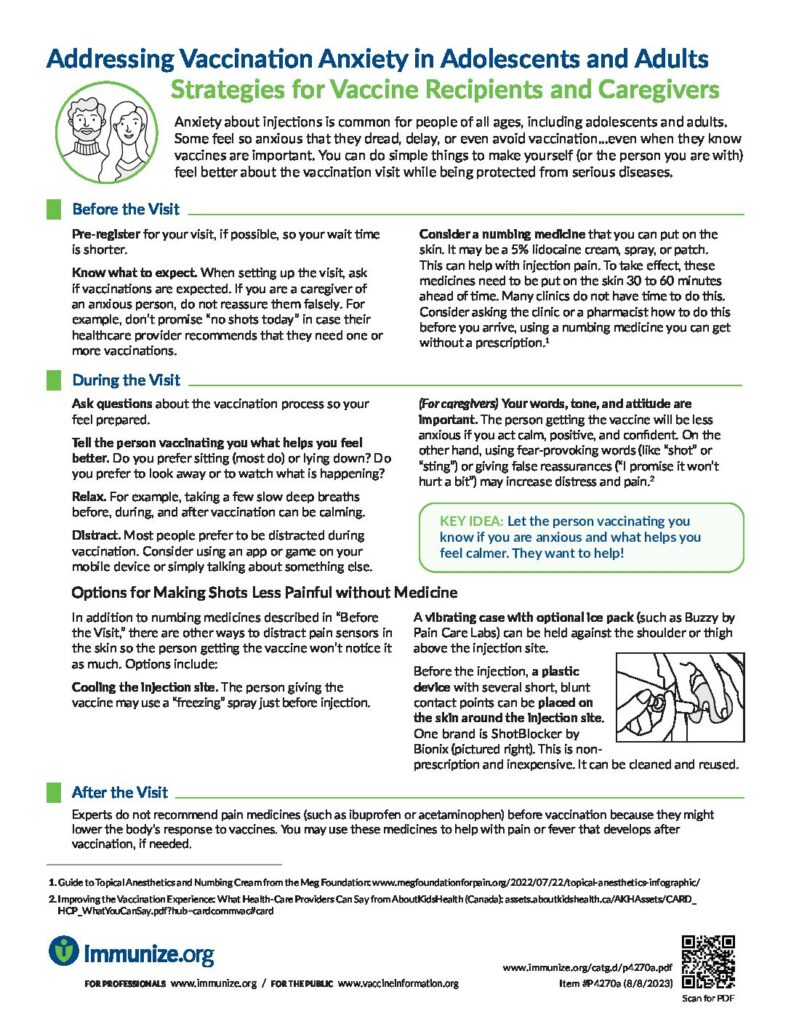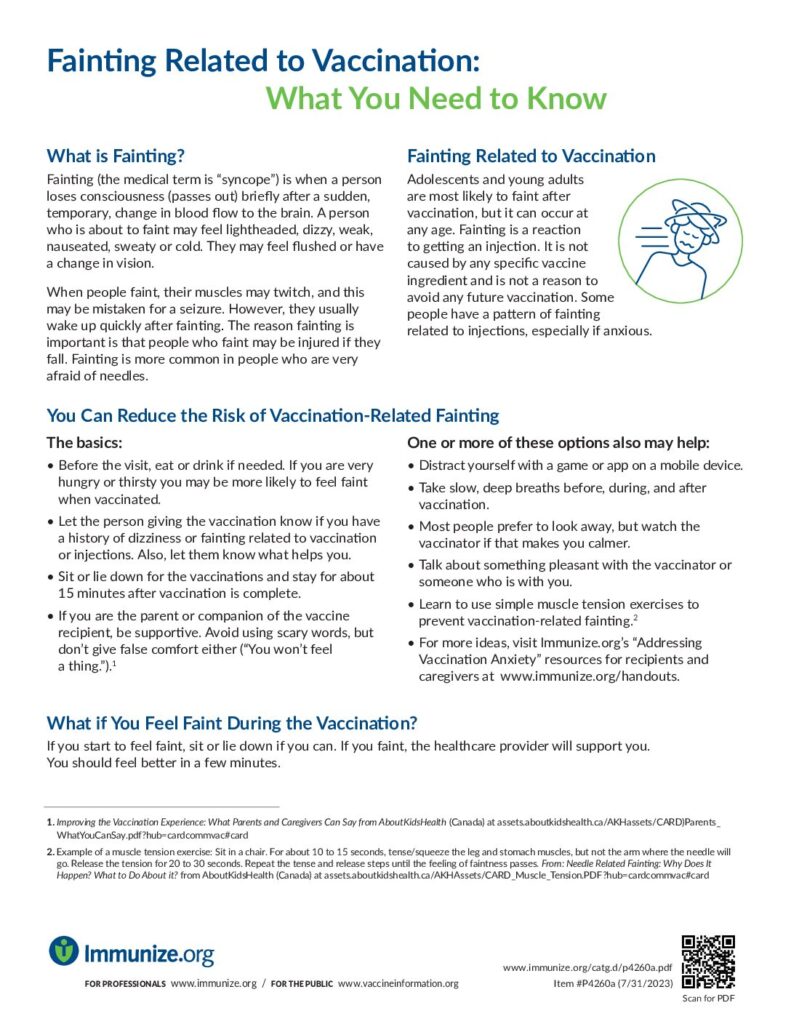 Var
Var If you’ve never had chickenpox or were vaccinated but received only 1 dose, talk to your healthcare provider to find out if you need this vaccine.
 COVID-19
COVID-19 All adults need to be protected from COVID-19. Vaccination needs to be repeated from time to time, either because vaccine protection wears off or because the vaccine needs to be updated in response to changes in the virus that causes COVID-19. Adults who are immunocompromised may need more frequent doses. Consult your healthcare provider to learn if you are up to date.
 DTaP/Tdap/Td
DTaP/Tdap/Td All adults who have not yet received a dose of Tdap, as an adolescent or adult, need to get Tdap vaccine (the adult whooping cough vaccine). After that, you will need a Tdap or Td booster dose every 10 years. Pregnant women need a dose of Tdap in every pregnancy. Consult your healthcare provider if you haven’t had at least 3 tetanus- and diphtheria-containing shots sometime in your life or have a deep or dirty wound.
 HepA
HepA If you didn’t get the vaccine as a child, you should get vaccinated now if you are in a group at risk for hepatitis A, or just if you want to be protected.
 HepB
HepB You need this vaccine if you have never been vaccinated against hepatitis B infection and you are younger than age 60. Those age 60 and over who have specific risk factors for hepatitis B or who want to be protected also should be vaccinated. There are several different vaccine options for adults: one option is given in 2 doses over 1 month, and others are given as 3 doses over about 6 months.
 Hib
Hib Some adults with certain high-risk conditions need vaccination with Hib. Talk to your healthcare provider to find out if you need this vaccine.
 HPV
HPV All men and women through age 26 years should receive this vaccine if they haven’t already received it. The vaccine can also be given to men and women through age 45 years. Check with your healthcare provider. The vaccine is given in 3 doses over 6 months.
 Flu
Flu You need a dose every year for your protection and for the protection of others around you.
 MMR
MMR You need at least 1 dose of MMR if you were born in 1957 or later. Many people need a second dose.
 MenACWY / MenB
MenACWY / MenB There are different types of meningococcal vaccines that are recommended for use in adults. People of all ages with certain medical conditions should get vaccinated and some should receive booster doses throughout life. These vaccines may be used to protect people during an outbreak of meningococcal disease.
- Meningococcal conjugate vaccine or MenACWY: If you are a first-year college student living in a residence hall, you need a dose of MenACWY if you have never received it or received it when you were younger than 16. Adults who are at risk due to certain health conditions (for example, lack a spleen) need this vaccine.
- Meningococcal serogroup B vaccine or MenB: MenB vaccine may be given to any adult who wants protection from this disease, preferably at 16–23 years of age. Adults who are at risk due to certain health conditions also need this vaccine.
 Mpox
Mpox Adults who engage in certain types of sexual contact should be protected from Mpox infection. Talk with your healthcare provider to see if you need this vaccine. The vaccine is given as two doses, one month apart.
 MMR
MMR You need at least 1 dose of MMR if you were born in 1957 or later. Many people need a second dose.
 PCV / PPSV
PCV / PPSV Adults age 50 years and older have options: they should receive PCV20 pneumococcal vaccine alone, PCV21 alone or they should PCV15 followed later by PPSV23. If you have already had one or more pneumococcal vaccines, you should talk with your healthcare provider about what options you have now. Adults younger than 50 who smoke cigarettes or who have certain medical conditions also should be vaccinated. Talk with your healthcare provider about protecting yourself from pneumococcal disease.
 RSV / RSV-mAB
RSV / RSV-mAB Adults age 75 and older and those 60-74 with conditions that put them at high risk of severe RSV infection should receive one dose of RSV vaccine. In order to protect newborns from RSV, RSV vaccination is recommended during 32 through 36 weeks of pregnancy at certain times of year (typically between September and January). If the mother is not vaccinated, the baby may be protected by giving them RSV preventive antibodies in an injection after they are born, the same way vaccines are given.
 MMR
MMR You need at least 1 dose of MMR if you were born in 1957 or later. Many people need a second dose.
 Zoster
Zoster If you are age 50 years or older you should get this vaccine now. A second dose is needed 2–6 months after the first dose.
 DTaP/Tdap/Td
DTaP/Tdap/Td All adults who have not yet received a dose of Tdap, as an adolescent or adult, need to get Tdap vaccine (the adult whooping cough vaccine). After that, you will need a Tdap or Td booster dose every 10 years. Pregnant women need a dose of Tdap in every pregnancy. Consult your healthcare provider if you haven’t had at least 3 tetanus- and diphtheria-containing shots sometime in your life or have a deep or dirty wound.
 DTaP/Tdap
DTaP/Tdap All adults who have not yet received a dose of Tdap, as an adolescent or adult, need to get Tdap vaccine (the adult whooping cough vaccine). After that, you will need a Tdap booster dose every 10 years. Pregnant women need a dose of Tdap in every pregnancy. Consult your healthcare provider if you haven’t had at least 3 tetanus- and diphtheria-containing shots sometime in your life or have a deep or dirty wound.
RESOURCES
Addressing Vaccination Anxiety in Adolescents and Adults: Strategies for Vaccine Recipients and Caregivers
This 1-page handout, designed for vaccine recipients and caregivers, describes strategies that can be followed before, during, and after the vaccination visit to improve the vaccination experience for adolescents and adults. Several useful resources are also listed.
CDC Official Schedule Information
Getting immunized is a lifelong, life-protecting job. Don’t leave your healthcare provider’s office without making sure you’ve had all the vaccinations you need.
Vaccines are routinely available at doctors’ offices, health centers, and pharmacies. Special vaccination clinics are sometimes held at schools or other public locations. For more information see Where to Get Vaccinated.


